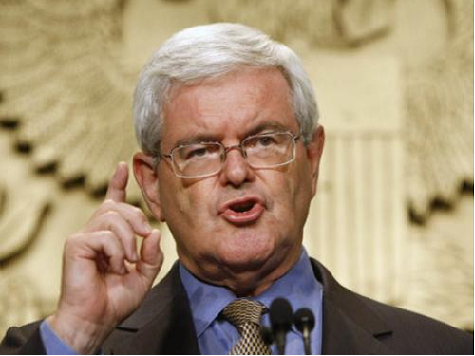
On Wednesday, Former House Speaker and presidential candidate Newt Gingrich blistered Republican consultant Karl Rove, saying Rove’s new super PAC that was created to wage war against conservatives and Tea Party candidates in GOP primaries should be “repugnant” to every conservative and Republican.
Gingrich, in his weekly newsletter, writes of Rove, “no one person is smart enough nor do they have the moral right to buy nominations across the country” and that a “bunch of billionaires financing a boss to pick candidates in 50 states” is “the opposite of the Republican tradition of freedom and grassroots small town conservatism.”
“That is the system of Tammany Hall and the Chicago machine,” Gingrich writes.
Gingrich points out that, while Rove likes to point to Christine O’Donnell’s 2010 loss in the Delaware Senate race as a reason for creating his super PAC, Rove-backed candidates in 2012 lost “winnable senate races in Montana, North Dakota, Ohio, Wisconsin, Pennsylvania, Virginia, and Florida.”
“So in seven of the nine losing races, the Rove model has no candidate-based explanation for failure,” Gingrich writes. “Handing millions to Washington based consultants to destroy the candidates they dislike and nominate the candidates they do like is an invitation to cronyism, favoritism and corruption.”
Gingrich writes that it is “appalling how little some Republican consultants have learned from the 2012 defeat” and “even more disturbing how arrogant their plans for the future are.”
He calls the system in which “smart” consultants design “strategy, spend the money and do the thinking” while the candidate raises money to pay the consultants a “terrible” way of doing things.
“Republicans need to drop the consultant-centric model and go back to a system in which candidates have to think and consultants are advisers and implementers but understand that the elected official is the one who has to represent the voters and make the key decisions,” Gingrich writes.
He lambasts Stuart Stevens, the chief strategist of Mitt Romney’s failed presidential campaign, for claiming the Republicans did not have a “140 character problem” in reference to social media and technology and downplaying how significantly Romney’s poor campaign lost the “Latino-Asian” vote.
Gingrich writes that people should read Craig Shirley’s histories of the 1976 and 1980 campaigns to discover a candidate — Reagan — who had core beliefs, knew why he was running, and knew what he wanted to accomplish.
The former House Speaker notes Shirley told him: “Commercial radio was a new technology in the early 1930′s and Reagan adapted to it. Talking movies were a new technology in the late 30′s and Reagan adapted to it. Network television was a new technology in the early 1950′s and Reagan adapted to it. If Reagan were alive today, he’d be tweeting.”
Yet, when former Alaska Governor Sarah Palin pioneered the use of Twitter and Facebook after the 2008 election by using the emerging technologies to go over the heads of the mainstream media to get her message out to the public, the Republican establishment — and the mainstream media — ridiculed her instead of seeing her as a pioneer. Gingrich himself was also an early user of Twitter, embracing the new media platform. The Republican consulting class mocked Gingrich and Palin for “tweeting” or “twittering” then, and that failure of imagination partly explained why Republicans lagged far behind Democrats in technology during the 2012 cycle. Gingrich said Republicans were a “midlevel college football team” while the Democrats were an NFL team playing in the Super Bowl during the 2012 elections.
Gingrich writes that the battle between the establishment Republican consultants like Rove and Stevens and the grassroots, tech and culture-savvy conservatives representing the “21st” century model may be the most important battle within the GOP since Ronald Reagan and Jack Kemp challenged the establishment Rockefeller “pale pastel” wing of the party in the 1970s.

COMMENTS
Please let us know if you're having issues with commenting.